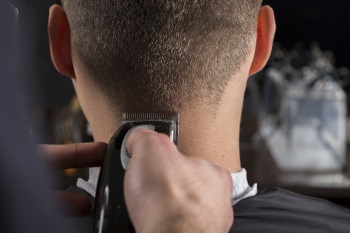Andre Lyons is a popular man at the Correctional Treatment Facility in Washington, DC. Once a month (or occasionally more frequently, if needed to calm rising tensions), Lyons enters the confinement unit, clippers in hand, to provide haircuts for the men in “the hole.”
 Being a prisoner himself (he was recently sentenced to seven years for conspiracy to distribute, and is awaiting a transfer to a federal prison), Lyons understands the importance of the little things that provide a sense of humanity in a harsh, sometimes dehumanizing environment. And this is even more true for men who have been isolated from the general population of the prison.
Being a prisoner himself (he was recently sentenced to seven years for conspiracy to distribute, and is awaiting a transfer to a federal prison), Lyons understands the importance of the little things that provide a sense of humanity in a harsh, sometimes dehumanizing environment. And this is even more true for men who have been isolated from the general population of the prison.
In an article for the Marshall Project, Lyons describes his role as the barber to the roughest residents in prison, and the lessons he has learned there.
The first thing Lyons does as he prepares to cut a prisoner’s hair is to hand him a mirror. “For most of the inmates,” he says, ” it’s the first time they’ve seen their reflection in a month, and they’re always shocked.”
The transformation that occurs in those few minutes is more than just physical. “No matter who they are, when I’m done cutting an inmate’s hair and show them the finished product, they don’t want to let the mirror go,” Lyons says. “They’ll keep looking at their reflection, saying they finally feel like themselves again.”
“Every prison is full of guys who would love to feel more human,” he concludes.
The need to “feel human” is vital to all men and women behind bars. Paying the price for their past misdeeds, they need to know that they still have value, and that redemption is possible.
Across the country, thousands of Prison Fellowship volunteers regularly enter correctional facilities, taking with them the love of Jesus, and a message that even men and women behind bars are of infinite worth to the God who created them. If you would like to learn more about how you can help bring light and encouragement to prisoners and their families, visit https://www.prisonfellowship.org/action.